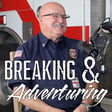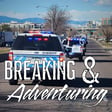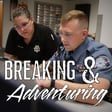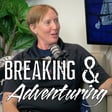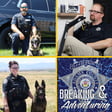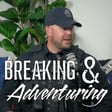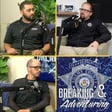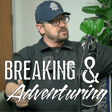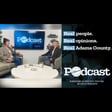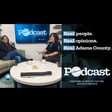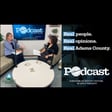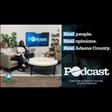Become a Creator today!Start creating today - Share your story with the world!
Start for free
00:00:00
00:00:01

Episode 15 - Into The Smoke
Pods:
For more than 40 years, Chief Investigator Jerry Means has dedicated his life to uncovering the truth behind the flames. From the Colorado Bureau of Investigation to Adams County Fire Rescue, Jerry’s work has often brought him side-by-side with sheriff’s deputies, unraveling the mysteries of fire scenes across the state. In this episode, he shares stories from the front lines of fire investigation—and how his passion helped preserve the legacy of America’s fire dogs.
Do you want to donate to help provide more trained fire dogs to firefighters throughout the country? Go to https://www.internationalfd.org/and donate today.
Do you have questions? We want to answer them. Send us an email to CommunityConnections@AdamsSheriffCO.gov
Recommended
Transcript
Introduction to Breaking and Adventuring
00:00:24
Speaker
All right, welcome to another episode of Breaking and Adventuring, where we look at the world of the Adams County Sheriff's Office and beyond. So we're going to share the background stories and experiences of the men and women in the Adams County Sheriff's Office and the greater law enforcement public safety community.
00:00:38
Speaker
I'm your host,
Jerry Means' Dual Role and Career Beginnings
00:00:39
Speaker
Commander Adam Sherman. Today we're visiting with Chief Inspector Jerry Means. and jerry Jerry is with the Adams County Fire Rescue and we're gonna discuss your career what's like in fire service and that dual role that you have with the Sheriff's Office and with Adams County Fire are you ready?
00:00:55
Speaker
Great right I'm ready. So just a little bit about your background your career how long you've been with Adams County Fire Rescue. Sure well it started years and years ago i was born in California and no we don't need to go back yeah kidding but uh I came to Denver after graduating high school in Canyon City.
00:01:15
Speaker
So I'd lived and down south my whole life and I got into the fire service. Did about 14 years in the fire service, paid and worked my way up to captain and then was hired by the Colorado Bureau of Investigation.
00:01:27
Speaker
And I worked for CBI in Denver as an agent. I did fire investigations throughout the state of Colorado and worked one of three canines that I worked over my career.
00:01:38
Speaker
I seem to always have a dog yeah you know through throughout my entire career. Three dogs throughout their working life. And when I retired from the state, I came transitioned over to Adams County Fire Rescue.
00:01:56
Speaker
Been there ever since, been there since 2019. Okay.
Transition to Fire Investigations and Law Enforcement Skills
00:01:59
Speaker
Nice. okay nice Got it right before COVID. Yeah. You know, I retired from the state on a Friday and I had Saturday and Sunday to be retired.
00:02:08
Speaker
And then I went back to work on Monday. There you go So here we go. I kept the habits. um Well, what drew you to career in fire service and how'd you find your way into fire investigation specifically? Was there a certain draw or interest there?
00:02:21
Speaker
Yeah, when I was initially in the fire service, we had an opening and in fire investigations, and we didn't really have anybody to fill that capacity. I was operating at a captain's level, and so they said, hey, you're in charge of it.
00:02:33
Speaker
And so I started putting myself through school and attending all these different trainings, and I I went to the National Fire Academy, the ATF Academy, all these wonderful opportunities to learn. and But just didn't have a a lot of practical experience actually doing fires.
00:02:49
Speaker
And so I started working on my days off from the fire service. And i started doing fire investigations. And that morphed into a very full-time, part-time job. Yeah. So I traveled around, did fires in Montana, Denver, Metro, Utah, Kansas, you name it.
00:03:06
Speaker
I'd get off from the fire service and fly out and do a fire investigation, come back. And so the experience level really started to increase.
Challenges of Fire Investigation
00:03:13
Speaker
Yeah. And what it sounds like to me too, and this might be for anybody looking to get in that line of work, but you really create a lot of those opportunities for yourself, seeking out the education, just looking for,
00:03:21
Speaker
ah those openings instead of kind of waiting for them to happen to you you went out and you tackled Absolutely. That's awesome. People are not going to just hand you things. If you're willing to work hard I think opportunities out there for everyone. Absolutely. Now can you walk us through what it means to be both a fire investigator as well as a deputized member of the sheriff's office?
00:03:39
Speaker
How does that work for you doing dual roles? um I believe as a fire investigator and just sticking with the fire science side of things, you limit yourself on on the skillset that you need to do this job.
00:03:52
Speaker
Because it's not uncommon to get halfway through ah an interview with somebody about what happened with a given fire scene and they become suspect. yeah And you become to try to, you know or you start to figure out that this person may have set this fire intentionally.
00:04:08
Speaker
And if you don't have that law enforcement skill set to draw from, um you can be in a tough tough position. And we do a lot of interviews, no different than any detective. you know you you serve yourself best and your case best by asking a lot of questions and and then being a good listener.
00:04:25
Speaker
And so, you know, I got the idea to to work on the law sort enforcement side of my career. I initially attended Jefferson County Sheriff's Department as a reserve. okay And became a post certified reserve there years and years ago.
00:04:41
Speaker
And I think I've been in law enforcement
00:04:45
Speaker
35 years and the fire service for 42. Okay. So, i mean, and so yeah through both sides, I'm sure, and what it sounds like, even with your investigations, I mean, you're really diving into the psychology of arsonists and just different behaviors, things to look for, um even whether it's, you know what you're seeing on scene as well as during the interview process. i mean that's fascinating.
00:05:09
Speaker
Yeah, a lot of those things are produced with forensic evidence and science. um that That helps us with the fire side of it. But human behavior and figuring out what somebody's thinking and trying to trying to construct your your questions you know a step ahead and and get all the information that's available out are skills that I've learned from seasoned law enforcement officers, people I've had the you know the the luxury to get to work with, you know, a seasoned homicide detective and stuff. They can teach you how to talk to people.
00:05:39
Speaker
Yeah, that that that mental chess game is fascinating. um So what does a typical day look like for you? even If there is a such thing as like a typical day, but what is your just your standard shift look like?
00:05:53
Speaker
Well, um fires are odd. Fires don't occur in the daytime. Fires, people see them. It's a small trash can fire. People put it out with an extinguisher. The fire department never finds out about it.
00:06:05
Speaker
It doesn't become an investigative matter. Fires, for me, happen in the evenings and on weekends and on holidays when people aren't around and it gets to be a big deal and it becomes harder and harder to determine where it started and how it started. Yeah. And so in saying that, that means my hours are off hours. I don't ever work a regular week shift, although I'm assigned to four tens. Yeah. But um I'm on call all the time.
00:06:33
Speaker
I've been on call at the fire department ever since I've been here. I was on call with CBI for like 22 straight years. um And there was only one of me at CBI.
00:06:45
Speaker
And so it keeps you from having a drinking problem. and There you go. You know, I mean, you don't have any time to yeah to do anything but work. But I love my work. I love the people I get to work with.
00:06:57
Speaker
And so I count my blessings
Identifying Intentional vs. Accidental Fires
00:06:59
Speaker
to get to do this. Yeah, that's incredible. What are some of the biggest challenges you face when you're investigating a fire scene? Well, fire's an interesting animal.
00:07:10
Speaker
it It creates evidence when it burns, but it also destroys evidence at some point in time. And so walking that thin line of, is this a directional burn pattern, and is it telling me something, or is it just an area that burned longer than...
00:07:28
Speaker
the other parts because it didn't get any water put on it in that given area. um those are Those make a fire scene very difficult. Wintertime is coming up and wintertime is brutal for us um because if it's,
00:07:44
Speaker
20 degrees outside and the wind's blowing, it's 15 or 10 inside a house that doesn't have any electricity, no lights, and four feet of water in the basement. um It makes conditions difficult, and they're very, very dangerous.
00:07:58
Speaker
Anytime you take us you know ah a stable structure, a house, and then you put it through fire where the drywall's off and the so wood walls are partially burned and the weight of the roof is...
00:08:12
Speaker
is um weighing down on all that destruction, these these scenes want to collapse. And you want to, you're, Gravity would tell you that you want to fall through the floor through the bit to the basement Yeah, and because sometimes you don't know how bad the floor is and so these scenes are notoriously dangerous and we take our safety very serious our fire chief drives home to us that that we need to go home safe every day and We have that environment here at the fire department. We have that environment at the sheriff's department um where we want to send people home safely every day and and so
00:08:49
Speaker
We're equipped with monitors to monitor the air that we're breathing because you can have pockets of hazardous gases and things and That's pretty much it in a
Team Collaboration in Investigations
00:09:00
Speaker
nutshell. It's a little crazy and yeah sometimes so in a general sense What are some things you look for ah to determine whether a fire is intentional or accidental?
00:09:10
Speaker
well Physical evidence for presents itself in a different way. Every scene is different. But um the obvious things that that would pop to me very fast are separate and uncommunicated areas of origin.
00:09:24
Speaker
Okay. So if we have a fire in the garage and then we have a fire in the shed and they're two separate buildings across the property from each other, that's a problem. Fire doesn't typically jump from one area to another without communicating in between.
00:09:38
Speaker
um Containers, odd times of the night, um blocked exits and entryways would be signs that why why is that that way? don sure You know, and essentially it's as simple as this.
00:09:53
Speaker
What we do is you ask yourself, what's different today than was yesterday? Because yesterday there wasn't a fire. Last week there wasn't a fire. Last month there wasn't a fire. So why is there a fire today?
00:10:05
Speaker
And we do a couple different things. We try to figure out, A, where the fire starts. And we do that based on post-fire travel indicators and intensity burn patterns and fire science. And witness statements, all those things collaborate together to determine where it starts.
00:10:21
Speaker
And then we start evaluating that area and trying to tighten it up as small as we can get it based on directional burn patterns. And then we start going through all the plausible causes. yeah And that means everything from careless smoking to candles, to incense, to intentionally open flame applied, things like that. Yeah. And it sounds like just law enforcement side and with the investigation side, just be naturally curious. Like, that's weird. Why why is that this way or exactly? you know Why is this day different? And
00:10:53
Speaker
Huh. And just keep going through that thought process of like, that's really strange. Yeah, exactly. It's, it's, um, I tell people all the time, the younger guys that are getting into this, it's not golf. And none of us are Tiger Woods. yeah Fire investigations is a team sport. And the more opinions, and it's usually the guy with the least amount of experience that brings the best stuff to the table.
00:11:15
Speaker
They ask those questions that you kind of go, oh yeah, that makes sense. We should answer that. Why is that here? Or why is that not here? and so It involves a lot of open dialogue and developing a hypothesis and testing that hypothesis, whether it be verbally or physically.
Compassion and Listening in Fire Investigations
00:11:33
Speaker
Will this stuff burn? yeah Things like that. Yeah, just selfishly, you know I've got a ah daughter who's now entering college, and it's funny seeing, or at least interesting, that even a lot of college programs are coming into having fire science as its own degree path.
00:11:48
Speaker
And so this is really you know just expanding as a discipline and as as a career field. So that's that's incredible. So and and it obviously leads to the work yourself and others like you have done the last 40 plus years to really bring the attention to it.
00:12:04
Speaker
um So now looking at like the impact of some of the things you've seen, fires have devastating effects on families and businesses. How do you balance the technical investigation side with the human side of your work? I mean, I'm sure you as you're coming in and just some some things are probably even very gut wrenching as you're going through your investigation how do you balance that when you know when you when you finally get the clock out for the day or night um i take it an extreme amount of pride and we get this from our environment that we work at adams county fire
00:12:36
Speaker
from the chief all the way down to the newest firefighter and I'm not saying this to as a cliche um I mean it and we mean it um we work for our community um we go to great lengths to care about people and I don't think there's there's a shame and investigative weakness in showing compassion for human beings I don't care if it's a homeless guy down on the trail or if it's a You know, I'm not the jury. I'm not the judge. My job is to collect data. Yeah. And, uh, when you're exposed to people that have lost everything they've worked for their, for their entire lives, so and maybe even a family member, um, if you can't reach a sensitivity with yourself, you're in the wrong job.
00:13:22
Speaker
Um, so I, I preach that to, um, my other investigator writer and, um, we we work really, really hard on being sensitive to people. I have tons of people on my cell phone that still call me to this day with questions. They haven't had a fire before. They don't know what the insurance company's gonna do. And I try to give them advice.
00:13:44
Speaker
But um we try to make strong impact immediately when it occurs. And whether that be giving a hug or just stopping and and just listening to people.
00:13:55
Speaker
You know, I think that's one of the biggest mistakes investigators make detectives make, um no matter what what assignment you have, whether you're homicide or whether you're arson or whether you're whatever, is not being a good listener.
Hollywood vs. Reality in Fire Investigation
00:14:10
Speaker
you know There's a lot of things to be said, just hush. Yeah. Listen. Yeah. And you brought up a great point because sometimes it's what's not being said, too, that's really important or not being mentioned. Absolutely. But, I mean, the main thing that I took away from that is you don't stop being a human just because you put on a uniform or, you know, you you clock in to do your job. I mean, you agree we're still humans. We're all part of the community together. and that's And I experienced that myself was activated forever.
00:14:36
Speaker
during the Marshall fires over in Boulder County. So I was, you we were blocking off entryway to one the neighborhoods and it just broke my heart, but just having family after family, they just wanted to see what may possibly be left of their home. and it was just unsafe. You mentioned the the instability of the structures and things, these, these homes, some of them still had fires burning.
00:14:55
Speaker
And I just, we could not let them back, but it was just gut wrenching as these people probably lost everything they had. So yeah, really just that human touch is incredible. And um it's amazing to hear that you bring that to your investigations.
00:15:07
Speaker
Well, I agree. Once you stop hurting, do something else. You're, you're at a place where you need to you need self-reflect and you need to probably go do something else because you're not effective. Yeah.
00:15:20
Speaker
It's okay to hurt. It's okay to, to cry in this job. It's okay to feel pain in this job. Yeah. Um, that, that's a ah real thing. And, and, uh, again, I, I don't want that to ever change for me.
00:15:34
Speaker
You know, i don't want to become that, that callous person. I've been on 2,600 fire investigations. I was on the Marshall fire as well. I assisted, uh, Um, investigator Doug Sava, he was the lead investigator of that massive fire. And, I helped him with that and it was tragic. Yeah.
00:15:54
Speaker
I can't even imagine, you know, uh, what those guys that were closer to it, that responded on it, um, went through Yeah. Well, some of them that I was working alongside lost, potentially lost their own homes, but they're still out there working for their neighbors, for their community. I mean, unbelievable that was, that was a tough one.
Collaborations with Agencies and Significant Cases
00:16:12
Speaker
Now to flip the switch a little bit on maybe a little lighter side. What are some misconceptions people may have about fire investigation from TV shows or movies or things like that? You know, if you have somebody who's really into like CSI and, you know, forensic files and things like that. I mean, are there any, you know, some of the phone calls of people ask certain questions that you can tell you like that might be a little bit more Hollywood.
00:16:32
Speaker
Sure. Well, they make the. The film makes the the job seem very glamorous and backdraft comes to mind. you There you go. Robert De Niro wearing a coat, walking in, lighting things on fire in a fire scene.
00:16:47
Speaker
We don't do that. The rest at ease. We don't come back and set your house on fire. um but ah The unglamorous part of it is the the weather plays a big factor in us.
00:16:59
Speaker
um it's It's tough conditions at times. And then it's manual labor. It's a lot of digging. It's reconstruction. um If you have a living room that is totally destroyed in the ceiling's now down on the floor and all the furniture's twisted and the fire guys have moved things around to check for victims and do a search of that area,
00:17:21
Speaker
um we come in and clean all that up and reconstruct the furniture because when the fire was burning, all that stuff wasn't in place. And we wanna see those burn patterns that are under all that stuff. And so it takes a lot of effort to dig all that debris out and to put it all back together. So yeah that's the unglamorous part of our investigations and it's very dirty work. yeah You know, you have to be careful.
00:17:48
Speaker
um Safety has come a long way and I think I mentioned we take safety very serious. um You know, I want my investigators that that work on calls to decon themselves and their equipment.
00:18:00
Speaker
So none of that stuff goes back home to their families, um to their pets, any of that type of thing. Myself, I've had cancer seven times. Oh, wow. Since I've been doing this.
00:18:12
Speaker
48 stitches on temples and 27 on this side. Everywhere you don't have protective gear and your skin is exposed, there's a lot of weird things that burn in fire scenes. And so lots of hydrocarbons and lots of cyanide gas and phosgene gas and things like that. And so...
00:18:31
Speaker
again, you got to take it serious if you're going to, if you're going to go the distance. Yeah. I've never seen that on TV. They never talk about that. All right. Um, so you mentioned some of the relationships you've built.
00:18:43
Speaker
How do you work with other agencies, whether it's local police, whether it's insurance companies, federal partners, when a case requires it, what does that look like? Well, um, we do that a lot here. Um, I think, uh, I had, wasn't,
00:18:58
Speaker
I want to say this right, I wasn't well known, but a lot of people knew me, um not because I was special or the best at this or that, but I had a very visible job at CBI where I worked with all different agencies every single day.
00:19:12
Speaker
And I got to develop a ton of relationships throughout the state. And right now, Westminster Fire, North Metro, Thornton, Brighton, we all work together as ah as a team, Federal Heights and We're the north area, if you will.
00:19:29
Speaker
And so we go and assist them and they come and assist us often. Again, it's that we're not Tiger Woods, you know, mentality. We you work it as a team.
00:19:40
Speaker
Everybody. I just had the whole group down on a fire a week ago, a big fire, big house fire. And 100 percent. hundred percent cooperation from everybody from the sheriff's department, sending detectives and people to walk around and canvas the neighborhood to every invest, every fire department in the North area, sent a fire investigator.
00:20:00
Speaker
And so one team, one fight. There you go. That's c incredible. That's awesome to hear. So now looking back at some of your career moments without naming any names, you don't have to out anybody.
00:20:11
Speaker
ah But is there a case that stands out in your memory that's especially impactful or maybe even unusual ah that you're like, oh wow. I think after all these years, 42 years and 2,600 fires, there are a number of cases that take you back to a certain moment, and good, bad, and different.
00:20:32
Speaker
um you You learn from them. Hopefully, you take something away that makes you a little better. But um worked everything from when I was at CBI, i was the fire investigator for the state of Colorado, and I worked at K9.
00:20:44
Speaker
and
00:20:47
Speaker
I also did cold case homicides and officer involved shootings. And any of those take me back to a dark place.
00:20:58
Speaker
Anytime one of our heroes um loses their life trying to save other people's lives, if that doesn't impact you, shame.
Working with K9 Units
00:21:06
Speaker
Shame on you. Columbine High School.
00:21:09
Speaker
um I think when I was at CBI, responded on three different high school shootings. Why? why Why are people killing our high school kids? It doesn't make any sense to me.
00:21:20
Speaker
And so that's the difficult part, trying to make sense out of things that honestly don't make sense and will never. You know, those are those are the ones that that take you right back to a place.
00:21:31
Speaker
Yeah, and i' and it sounds like, and I'm just assuming, but I know for me on some of my cases, it made me work and gave me that drive a little bit more to where I'm, you know, I don't want this to keep happening. So whatever I could do personally to put into a case or, you know, wider, you know, purpose really, really kept that drive alive in me.
00:21:49
Speaker
Agreed. um So what's a surprising thing you've discovered in a, or an unusual thing you've discovered in a fire investigation? um I think the most surprising thing I've had over the years is the response from dogs. I worked dog on a lot of fires, three different dogs, and they never cease to amaze me.
00:22:12
Speaker
The last dog I worked on, the last fire that he worked, and he's since passed away, Riley, but gave me goosebumps when he did what he was supposed to do.
00:22:23
Speaker
And lots of funny stories with the dogs, but also... um I always tell people they have unlimited potential. Every dog, every dog at your house, every dog,
00:22:35
Speaker
that you see working, they have unlimited potential. I don't think we have a clue what they can
Unexpected Outcomes in Fires
00:22:40
Speaker
do for us. yeah They're operating on a whole nother level. There's dogs that sniff cancer now. ah wow There's dogs that um obviously find lost kids, catch bad guys, sniff out fires. yeah So obviously a strong dog person. yeah Got lots of history with dogs. So they could do more than just sniff treats. That's exactly right.
00:23:01
Speaker
um So is there something, what's like a strange item that survived a fire almost intact that probably shouldn't have? Did you ever like come across anything you like, wow, how did that survive? One story comes to mind.
00:23:12
Speaker
Went out east, did a huge fire at ah at a lumber yard. And the entire building's burned down. It's a lumber yard. It's got lots of fuel, meaning the lumber and all the contents.
00:23:24
Speaker
And that place was burnt to the ground. You know, we like to say... when you're talking to the volunteer firefighters that are there kind of feeling bad because it's so much damage. yeah they're all hanging their head low.
00:23:36
Speaker
And I always tell them, well, hey, look at it like this. It's easy to photograph. First floor, second floor, roof. You don't have to run around a lot. and But i go I look at this lumber yard and one thing just stands out and it's a bucket.
00:23:51
Speaker
It's a plastic bucket that's sitting right in the center of the scene. And I mean, the scene is charred. Yeah. I'm thinking, how in God's name did that bucket survive? Nobody's walked in there. Nobody placed it in it Yeah.
00:24:04
Speaker
And so finally, it it just really played on you for a while. But the very corner of the building, 50, 60 feet from that bucket, was a little piece of the roof left.
00:24:17
Speaker
And there was a round pattern on that piece of roof. And the fire had occurred, burned the whole building down, huge flames, and the the outside walls just stayed intact, stayed intact. That little bucket just sat there and had a front row seat to this fire.
00:24:32
Speaker
And it didn't melt. And then all of a sudden the wall, once the fire's died down water's been put on it, the wall just slightly collapses inward and that bucket comes tumbling off and lands right in the middle of the debris, just
Firefighters and Law Enforcement Relationship
00:24:45
Speaker
unburned. There you go. So there's a reason for everything. yeah the little bucket that could. That's right.
00:24:50
Speaker
um So you mentioned, ah right we've talked about your dual roles. Now, it's fairly common knowledge in public safety world that there's this love-hate family relationship with with police and fire.
00:25:04
Speaker
So any of your fellow law enforcement or even fire people kind of treat you different or kind of razz you a little bit about being kind of dual purpose? I have great relationships, great friendships, lifelong friendships in both groups.
00:25:18
Speaker
And I really believe, although I've heard that many times, love-hate relationship, it's a love-love relationship. um I cherish getting to see the the road deputies out on these fire calls.
00:25:31
Speaker
They're the first ones there. They have all this great information, and we've become very friends, or very good friends. And of course, you know, I have a ton of friends in the fire service. I love this place that I work at.
00:25:43
Speaker
I cannot sit here right now and I would never throw a name out there, but I can't sit here right now and say one single person that I don't really, really care for. Yeah. And that's, that's hard.
00:25:54
Speaker
Yeah. It hasn't always been that way at different workplaces. Yeah. No, I think it's funny in my experience, like that sibling rivalry kind of thing, but yeah, it's definitely, but don't mess with the family. Like we, we definitely protect each other.
00:26:04
Speaker
I work with detectives a lot over at Adams County SO and they have different areas of expertise and every single one of my walk the substation over there and I get treated like I work there every single day we go to the range we call with each other and I love every single one of them they're amazing people um when they're happy I'm happy yeah they hurt I hurt You know, we have ah one detective that's assigned to us.
Fire Safety Tips
00:26:38
Speaker
His primary job is fires. And so that's Jenkins. And I love Jenks. You know, he's a he's a classic guy. yeah
00:26:47
Speaker
And I've known him for a long, long time. So it obviously brings a smile to my face even to just think about him. Fabulous. So you mentioned doing some of these interviews.
00:26:59
Speaker
What's like the funniest excuse you've gotten from somebody trying to explain how a fire started? Like I think about like the movie, was it Orange County where he's like, oh, it was, she was like, you better not. And he's like, it was, she said, electrical oh yeah, it was totally electrical fire. Like, so I didn't know if they're like, and whether it's an interview on scene where somebody just came like it's some completely absurd story of how that this fire may have occurred.
00:27:21
Speaker
Well, no different than law enforcement where some guy says they pull dope out of his pocket and he says, these aren't my pants. Yeah, these aren't even mine. Okay, you're wearing them. Same type of thing. We get people that that have odd answers that don't make any sense. and and But for the most part, people...
00:27:39
Speaker
people aren't experienced about answering questions about fires, you know, um because it's very rare to have a fire in your lifetime. And I hope nobody here has, but um you know, you should go your whole lifetime without having a significant fire in your house or in your, on your property or in your car.
00:27:58
Speaker
And then when somebody has had two or three, that's a red flag. That's not a red flag. That's a yeah You know, we got to ask why, but. That's funny. um Well, speaking of like, what's, what's a simple thing somebody could do um that could save their home or their life from a fire? So you mentioned, you I, hopefully nobody really has to experience this, but, but just a simple tip or something you may have for somebody. The simple tip would be, um,
00:28:24
Speaker
Pay attention, that's all. Don't get so caught up in your world or your phone or your anything where you're not paying attention every day to what's around you. Whether that you're in the supermarket and that can that can protect you from not only fire, but from somebody that doesn't have your best interests at heart. yeah And be be conscious of your surroundings.
00:28:46
Speaker
I said earlier, one of the things an investigator does is walk in and go, what's different? What's different today? How come this is this fire happened? It's no different walk in your house and if something doesn't smell right If there's a haze, there's a reason for that haze. There's a reason for that odor Don't hesitate to ask for help be investigative yourself.
Career Reflections and Advice
00:29:08
Speaker
Try to figure out what's going on, you know a big common problem that we have right now is lithium ion batteries.
00:29:16
Speaker
It creates a lot of fire hazard for our community. Lots of calls that we go on are either related semi or directly to lithium ion batteries.
00:29:27
Speaker
People leave them on the charger indefinitely. They forget about them. Bad idea, guys. Yeah. It's you got to watch it. Pay attention to it. Once that light turns green, says that battery is ready to go, unplug it.
00:29:40
Speaker
and Take it out of the charger and it should be fairly safe for you to to use when you need it. But leaving them on the charger is the single worst thing that you can do for these batteries.
00:29:51
Speaker
Disposing of them improperly, throwing them in the trash can. These are not your little... de-sized batteries in the old days that don't produce much power these things can catch things on fire and they do yeah so you heard it here first don't set it and forget it pay attention exactly right um so going back to your career a little bit so if if we could just pull up in a delorean and we can go back 40 years and you could talk to a younger version yourself what's what's a piece of advice you would give yourself about starting your career
00:30:21
Speaker
I don't know that I have a single thing that I would, I count my blessings to get to have done what
National Fire Dog Monument and New Nonprofit
00:30:28
Speaker
I've done. I mean, ah it it's it's been a blessed career.
00:30:32
Speaker
i've been I've received a ton of support from my family to do this because it's taken time away from them. yeah And i have a daughter that's in the fire service, super proud.
00:30:43
Speaker
But um shea she used to play softball, competitive fast-pitch softball, and I lived for it. It was so fun. We'd travel all over the country, and she'd play softball. And I would make it a point to not miss a game.
00:30:55
Speaker
And I was on a schedule that we talked about. It was all over the place where I was driving to Cortez. And I would drive all night sometimes to get back to watch her play softball. I was probably about half awake, half asleep. i don't know.
00:31:06
Speaker
But you were there. but But no, it's been a an incredible career. you know I reached a point. um where I was so so so thankful for getting to work these dogs.
00:31:18
Speaker
And one of my dogs had passed away and i I just felt like I should do something to honor these dogs. And arson dogs, fire dogs, did not have a monument. They didn't have any recognized place that that said, hey, they did this this great work.
00:31:33
Speaker
and military dogs did and and police dogs did and fire dogs did not and so i developed a non-profit called national fire dogs and uh it took six years of my life i had a hair when i started the thing and i raised all the money um for the non-profit and we built a seven foot tall statue of a bronze firefighter in gear and a dog sitting next to him and they they're looking at each other and that monument is in Washington DC between the Capitol and the White House and it's at fire station number two in DC and it was sanctioned a national monument it's on the bus route if you take the tour you get a CR monument that's a credit
00:32:18
Speaker
I put that together, an incredible artist that's also a volunteer fireman up in Windsor Severance, um Austin Weischel sculpted it and did a fabulous job. So to me I encourage anybody if they want to see what it looks like, yeah get online, look up National Fire Dog Monument.
00:32:33
Speaker
And I wrote the plaque for it. Got a chance to put my family's name on there. Yeah. And that's something that I always look back at because I had the misfortune of losing a daughter. And so my middle daughter, Courtney, um passed away, but her name is forever in bronze because I was, I had the, the,
00:32:51
Speaker
I don't know, the vision, I guess, to put her name on there with the rest of my family. And so that's a wonderful thing. I want to say, like, two two or three years ago, it was in a contest with the Washington Post, and the monument was.
00:33:07
Speaker
And we thought, oh you know, what a nice honor. Well, it ends up winning. It's the most popular monument in Washington, D.C. Beat out the Lincoln Memorial. That's incredible. Beat out of Washington Monument.
00:33:19
Speaker
but So it's pretty cool. Yeah, so we encourage anybody on your travels, go check it out and through you know tag Adams County Fire Rescue on social media with your pictures. That'd been honored to see it that'd be great. Well, with that, so you're you're the president of the association.
00:33:32
Speaker
How can people find out more about it and even support if they'd like to do that? Well, I got a couple of them. The National Fire Dog Monument has come and went. okay It exists and there's no follow-up needed on it. And everybody in the country, especially this fire department, helped me build that thing. That's amazing.
00:33:48
Speaker
um But now, ah since I was successful with one nonprofit, i was...
00:33:57
Speaker
goofy enough to start another one. State Farm Insurance Company for 30 years sponsored arson dogs. I got my three dogs from a grant from State Farm Insurance Company. okay And they did that for 30 years. And this last year, they decided to go a different direction with their funds.
00:34:16
Speaker
And we thank them for the 30 years. Certainly disappointed that we don't have them as ah as a big brother type partner, big sister type partner um going forward. However, that left a void. The program was not funded.
00:34:30
Speaker
Zero. And so I developed a new nonprofit. It's called International Fire Dogs. And so our little nonprofit, I'm the executive director of it. um My investigator here, Ryder, is our secretary.
00:34:43
Speaker
I'm partnered with a guy named Alan. I'm just, um I'm not going to say his, I'm not going to say his name. But director. because he might not want that. But anyway, we have a ah fellowship and we created the board. And then we started running around trying to raise money.
00:35:05
Speaker
um One of the handlers
00:35:10
Speaker
did a ton of work on grant writing and put a bunch of information together. And we were just awarded three days ago, essentially a million dollar grant from fema And so we're blessed and thankful for that. So the program is not going to just fall away. It's not going to be operating at the level we'd like it to and putting on as many dogs in the country and Canada as we'd like.
00:35:34
Speaker
But it's a it's a great start. And for the next three years, we're going to work really hard to get that completely funded.
Evolving Fire Investigation with Technology
00:35:41
Speaker
and uh and that again is international fire dogs you can go online you can make a donation five dollars helps everything helps and what you're doing when you do that is i work for free my entire board is not on an income at all we all do it for free for the love of the dogs and the dogs in the program and so 100 of your donation whether you're a corporation or whether you're a single person um
00:36:09
Speaker
goes to the the program awesome yeah we'll we'll definitely put a link in the description thank you come check it out appreciate that so as we wrap up here so we talked a lot about the past i'm curious a little bit about the future and what what you're seeing so how has fire investigation changed with new technology and where do you see it heading like the next like five to ten years it changes every year we're uh guided in fire investigations by ah a manual um they call it a guideline but um It's a book called the NFPA 921.
00:36:41
Speaker
And that has gotten thicker and thicker and thicker over the years because our trade,
00:36:48
Speaker
trade um It's very, very science-based and there's a lot of very intelligent people that work for the NFPA 921 committee and put a lot of effort and time into it.
00:36:59
Speaker
um There's great names in the business. John DeHaan, who's not too long ago passed away, but um names like that come to mind that, that that try to hold us to a higher standard. yeah And once you become stagnant and you just stay where you're at, you're setting yourself up for failure.
00:37:19
Speaker
yeah And so every year it's become more and more challenging and more and more science-based. You know, the bottom line is all of us investigators wanna get it right.
00:37:30
Speaker
We don't want any guesswork in it. If we're going to come into your property and say this happened or that happened, we want to we want to be very accurate with that analysis. Yeah, we don't want to guess at it. And there's there's lots of things that that we all did way back in the day um that were now scientifically impossible. They didn't happen.
00:37:51
Speaker
And so shame on us if we don't continue to
Role of Fire Investigators in Prevention
00:37:54
Speaker
move forward. Correct. Yeah. Push the envelope. um So just in general, when you when you meet people in your out in the community, what do you hope people take away about the role of a fire investigator and the importance of this work just to the greater community?
00:38:08
Speaker
Well, um fire investigation. by design is not to run around and find criminals and put them in jail. We would like to discover things that are creating a trend and that are causing fires. And we've had that. We had a fireplace fire um in an outdoor type box that was mounted to the side of a house where the flu went through.
00:38:31
Speaker
And all a sudden we had a fire in there and and no big deal, but you look at it and it was construction caused. They had put the pipe in there too close to the sides of the wall and they built it together.
00:38:43
Speaker
And so within a couple, three weeks, we had a second. Fire flew fire um in that same neighborhood.
00:38:55
Speaker
And so then that constituted going in and having the the builder take all those apart and fix them right. Yeah. and Thank God it was just property damage, which we can all tolerate.
00:39:07
Speaker
We don't like it. It's your property. Who am I to say property damage isn't important? Those are your photographs and your memories and that's that's important stuff, but at least it wasn't any loss of life.
00:39:19
Speaker
But um we wanna work with our prevention bureau. Here at Adams County, they're two separate divisions. We have... a busy enough area where we do a lot of fire investigations. i think we did 112 last night was 112 since January. Wow.
00:39:36
Speaker
And so that's a lot of fires. Our crew does a great job putting these things out so we can come in and figure them out. Yeah. But um and then we work with our Prevention Bureau a lot. um You know, whether it's having them help us interpret, you know, we have three or four in our bureau that are Spanish speaking.
00:39:53
Speaker
um And the head of our Bureau, our Fire Prevention Bureau, and the Deputy Fire Marshal as well, um both encourage us all to work together.
00:40:04
Speaker
And so we use them a lot in that capacity, but we also provide them information. If we start seeing something happening, if we have a juvenile issue, where we have kids that are setting fires or a kid that is setting a fire.
00:40:17
Speaker
um It's not in the best interest and not allowed actually for a fire investigator to counsel that kid and put them through what we call a juvenile fire setters program. But prevention provides that tool where they can take a kid and they have several times here set them down and figure out what the root of the problem is, work with the parents and trend them away from setting fires intentionally.
Advice for Aspiring Fire Investigators and Conclusion
00:40:42
Speaker
Yeah, know because we don't want them to get killed. We don't want them to lose their property. Yeah. and And you're looking at not just a single incident, but now you're you're impacting people. and They don't even know it that you're, especially like with the fireplace example, you know, you're you're protecting all these other homes in the neighborhood and they didn't even realize it till much after. So that's, that's incredible.
00:40:59
Speaker
um Well, If someone wanted to become a fire investigator, what advice would you give to them just getting a foot in the door? Um, the majority of times, most of the fire investigators I know have gone up in the ranks.
00:41:12
Speaker
So it's not something that you typically hire in the, in the, uh, public fire service from the outside. You know, you don't just go shopping for a fire investigator. It happens, but it's not common.
00:41:24
Speaker
Um, usually a guy starts riding a truck. He's a rookie and, uh, works his way up and you know, then you end up getting interested in fire dynamics and, uh,
00:41:36
Speaker
analyzing burn patterns and becoming a certified fire investigator. And then you trend over into that. And I can tell you that my investigator that works with me, Ryder, he's in the police academy right now.
00:41:50
Speaker
sir He's working on on finishing that up. I think he's for started his thirteenth week. And but he came up through the fire service yeah and was in online in Idaho. And then we were lucky enough to get him here.
00:42:06
Speaker
And he was in our prevention bureau as an inspector. And so he just got such a well-rounded background. And then so if you follow his lead and then he became certified as a fire investigator, still no real experience doing it, but he became certified and just kept working, kept learning. And he's got that work experience though of just being there on those scenes and kind of, yeah. Exactly right. And so then once you become certified, um then recognize that you don't know everything. Yeah. And the learning really starts. Yeah. And you start going on fires and going on fires and going on fires. And pretty soon you...
00:42:41
Speaker
you're starting to get a knack for it. And then remember that you're just one voice in a team. yeah And don't ever ever get that mentality that you know everything and you just walk in and oh, that's what it is. you know Somebody's livelihood is at stake here. Take your time, take a deep breath,
00:42:57
Speaker
Attention to detail. Yeah, I think that's great ah that's great advice for anybody in the public sector, private sector. But yeah, I mean, learn learn and cooperate and function as a unit, as a team. That's that's great That's huge. Well, thank you, Jerry. I appreciate your time. I appreciate you you know just sharing your world with us.
00:43:12
Speaker
and and our followers. um So follow us on all the major social media, Fire Adams County, Fire Rescue as well on all your major platforms. And feel free to email us if you have a question, if you have an episode idea, ah download our app. But you can reach out to us at communityconnections at adamsheriffco.gov. Until next time, thanks.

